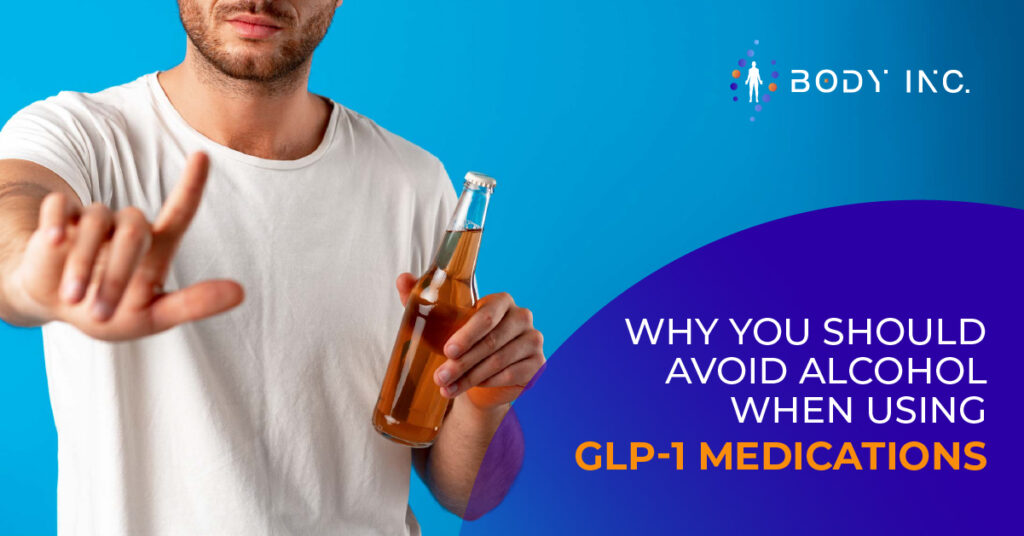
For individuals on GLP-1 medications, our relationship with alcohol is more important than ever.
GLP-1 receptor agonists are powerful tools in managing type 2 diabetes, obesity, and metabolic dysfunction. They regulate appetite, slow gastric emptying, and help stabilize blood sugar. But when alcohol enters the picture, it can interfere with these effects, sometimes in subtle ways, other times with serious consequences.
If you’re taking or considering GLP-1 medications, here’s why avoiding or minimizing alcohol could be a game-changer for your results—and your long-term health.
How GLP-1 Medications Work—and Why Alcohol Disrupts Them
GLP-1 medications mimic a natural hormone your body releases after eating. This hormone helps control appetite, boost insulin, suppress glucagon (a hormone that raises blood sugar), and slow digestion. Together, these effects help regulate blood sugar levels and support weight loss.
Alcohol, on the other hand, works against many of those same functions:
- It disrupts blood sugar control by interfering with glucose production in the liver.
- It adds empty calories that bypass satiety signals and encourage weight gain.
- It can trigger nausea, dizziness, and fatigue, especially when paired with GLP-1 medications that already slow digestion.
- It reduces inhibitions and impulse control, increasing the chances of overeating or making unhealthy food choices.
When you mix the two, the result can be unpredictable and dangerous.
Alcohol and Hypoglycemia: A Risk You Can’t Ignore
For people using GLP-1 medications to manage diabetes or insulin resistance, alcohol poses a unique risk: hypoglycemia, or low blood sugar.
Here’s why: alcohol suppresses the liver’s ability to release glucose into the bloodstream. At the same time, GLP-1 medications are enhancing insulin sensitivity and promoting insulin secretion. The result? You might experience a blood sugar crash, even several hours after drinking—especially if you haven’t eaten.
Symptoms of hypoglycemia include:
- Shakiness or sweating
- Rapid heartbeat
- Dizziness
- Confusion
- Irritability or mood swings
- Fainting or even seizures in severe cases
These symptoms can overlap with those of intoxication, making it harder to recognize the warning signs in time.

Alcohol Increases the Side Effects of GLP-1 Medications
GLP-1s are known to cause nausea, vomiting, and delayed gastric emptying in some users—especially during the early phases of treatment. Adding alcohol into the mix can amplify these effects and leave you feeling miserable.
For example, alcohol can:
- Irritate the stomach lining, increasing the likelihood of nausea and acid reflux
- Dehydrate you, which worsens dizziness and headaches
- Interfere with liver metabolism, complicating how your body processes both alcohol and your medication
The result? A cocktail of discomfort, fatigue, and regret—plus diminished results from your treatment.
The Behavioral Link: Alcohol and Impulse Eating
GLP-1 medications help you feel full sooner and stay full longer. They reduce cravings and help users break cycles of emotional or binge eating. But alcohol can undo that progress quickly.
Alcohol lowers your inhibitions and impairs decision-making, making it easier to:
- Eat foods you’ve been avoiding
- Overeat past your satiety point
- Skip healthy habits like hydration, sleep, or movement
These behaviors not only derail your weight loss goals, but they can also impact your motivation and mental health.

Body Inc. Helps You Stay Focused on What Matters
At Body Inc., we don’t just prescribe GLP-1 medications—we offer a comprehensive telehealth platform designed to support your entire metabolic health journey. That includes personalized education around alcohol use, nutrition, and lifestyle choices that align with your medication plan.
When you partner with Body Inc., you get:
- A custom plan built around you—your goals, your labs, your life
- Real-time access to medical experts who guide you through side effects, food choices, and behavior changes
Ongoing support to help you avoid common pitfalls—like alcohol-related setbacks—and stay on track for sustainable results
The Bottom Line: Alcohol Awareness = Metabolic Empowerment
This Alcohol Awareness Month, it’s time to ask: Is that glass of wine, beer, or cocktail really worth it—especially when you’re investing in your health with GLP-1 therapy?
For many people, taking a break from alcohol or cutting back significantly can amplify the effects of GLP-1 medications. You’ll notice better energy, fewer side effects, and a greater sense of control over your food and your body.
And with Body Inc. by your side, you don’t have to figure it out alone. We’re here to help you build a future of strength, clarity, and balance—one choice at a time.